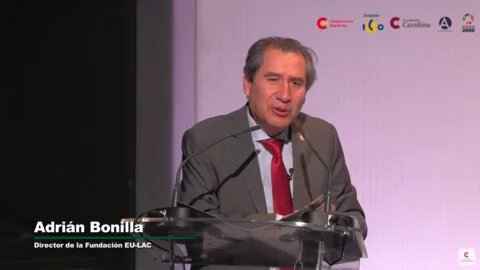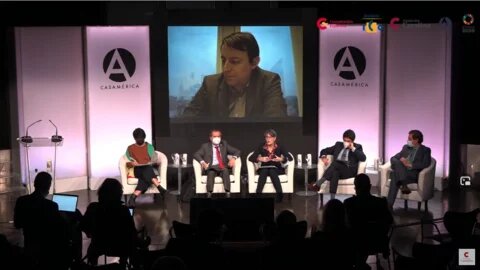The Executive Director of the EU-LAC Foundation, Dr Adrián Bonilla, participated from 30 November to 1 December in the international seminar entitled "Relaunching relations between Latin America and the European Union: strategic autonomy, advanced cooperation and digital, green and social recovery" organised by the ICO Foundation and the Carolina Foundation in Madrid.
The objective guiding this space was to analyse and debate the renewal of dialogue and cooperation between Latin America and the European Union for digital, green and social recovery, and to jointly expand the strategic autonomy of the bi-regional relationship. The event accompanied in parallel the meeting of leaders of the European Union (EU) and Latin America and the Caribbean (LAC) organised by the EU and the Presidencies of the Latin American and Caribbean regional and sub-regional organisations, which took place on 2 December.
Dr Adrián Bonilla was a speaker at the round table on bi-regional relations in the post-pandemic scenario together with Javier López (MEP and Co-President of the Euro-Latin American Parliamentary Assembly), Nahuel Odone (Head of the department for the promotion and exchange of regional social policies of the MERCOSUR social institute), Andrea Costafreda (Programme Director for Latin America and the Caribbean of Oxfam Intermón), José Manuel Rodríguez (Head of Institutional Affairs of the Cabinet of the Presidency, Iberdrola) and the moderator Anna Terrón (Director of the International and Ibero-American Foundation for Public Administration and Policies - FIIAPP).
The discussion focused on identifying the elements necessary to answer the questions: why a new narrative around the relationship between the European Union and Latin America, what would this new narrative look like, and with which actors? Among the findings, participants concluded that in addition to the common history and values shared by both regions, this bi-regional cooperation has the potential to be a space capable of avoiding marginalisation in an international system where China and the United States play leading roles. Considering the large number of countries that make up both regions, being able to join forces between LAC and the EU would allow them to have relevant political weight in the multilateral system. In this sense, it was acknowledged that the structure and system of relations within the EU favour the participation and integration of local governments in international dynamics on both sides of the Atlantic, which means that the bi-regional relationship is defined by a series of social, economic, political, cultural and academic interactions that are not regulated by states, and which in turn create twinning and networks between societies with the capacity to reduce asymmetry.
In this sense, Dr Bonilla emphasised that Europe, Latin America and the Caribbean share a similar vision in the political, economic, social, cultural, academic and development aid spheres, as well as a coincidence in environmental issues and the Sustainable Development Goals. Furthermore, he recommended that
"The two regions should not abandon the model of the Presidential Summits, but beforehand we suggest launching high-level thematic meetings around positive agenda items, e.g. on science, technology and innovation."
In terms of a new narrative on the EU-LAC relationship, participants agreed on the broad common working umbrella of crisis recovery and just transformation, with subordinate issues such as the green and digital agenda, and social cohesion. While the possibility of thinking about a sustainable, egalitarian, digital and green recovery opens up different possibilities for cooperation, there are also several challenges to be faced. Since it will take more than a decade for the most vulnerable populations in LAC to reach pre-pandemic levels of development, fiscal mechanisms must be found to combat the severe inequality in the region. Among the many challenges are also the economic and social valorisation of unpaid care - which mainly affects women -, digital transformation, investment in infrastructure, as well as the creation of less bureaucratic and environmentally friendly regulatory frameworks, and the transition from fossil to renewable energies.
In terms of actors, participants discussed the role and involvement of civil society and the private sector in decision-making processes. The pandemic has taught us the capacity of different social and scientific initiatives to mobilise resources, build partnerships, and innovate. Neighbourhoods on both sides of the Atlantic have become social laboratories, developing joint strategies for solutions to current challenges. Likewise, we have seen the emergence of movements that promote the rethinking of the democratic and social pact, which presents us with the challenge of finding new mechanisms to involve all sections of society in these dialogues.

